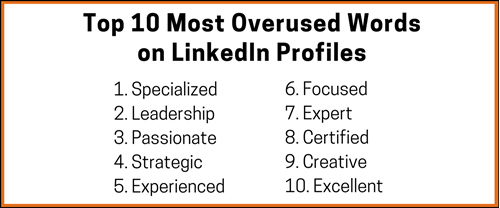10 Words to Avoid on Your LinkedIn Profile
By Allison Kruse, Kforce
Think about how you describe yourself to others. Do you use words that are overly-generic and dull? Or are they detailed, compelling and designed to make you stand out?
Words play a pivotal role in your professional brand online, especially on LinkedIn. Your profile can make or break opportunities when it comes to networking, future employers and more. Isn’t it worth your time to create a profile that stands out from the competition?
Most people may be satisfied with their current job but are open to a new opportunity. You never know when a potential employer is viewing your profile, and you don’t want to miss out on your dream job because your profile is vague and you’ve failed to optimize your personal brand. And, if you are actively looking for a new job or career, experts say professionals need to focus on their personal brand even more than those who aren’t.
Interested in the latest job search tips? Check out our 2019 Job Search Guide.
As important as our personal brand and/or professional brand is nowadays, I’m surprised more people don’t take this seriously. Many people slap on overused buzzwords when describing themselves on LinkedIn—words like “excellent” and “expert” that don’t help a person stand out. Littering your profile with nondescript words will not impress a hiring manager.
Here are LinkedIn’s top 10 words to avoid on your profile:

Business Insider and best-selling biographer Christopher Sandford partnered to study why people use language that makes them blend into the background rather than get noticed. Here’s what they found, taken straight from their article:
- Ease: Using new language and being creative with the words on our profile can be a daunting prospect and it requires effort. Opting for common buzzwords requires less thought and is often a more convenient approach.
- Everyone else does: We've seen our peers use buzzwords and assume it's the right thing to do—we think they sound professional without giving much thought to what the word really means.
- Association: Some of us use buzzwords to illustrate and convey belonging to a certain group, or industry. It helps us to feel part of something and like we fit in.
- Appearances: Buzzwords are often used to seem knowledgeable when we're not confident talking about our professional achievements. Writing about ourselves is a challenge and using buzzwords is a way to avoid specifics.
Don’t fall into the trap of using boring, overused buzzwords.

